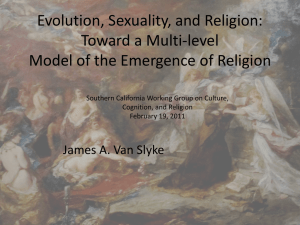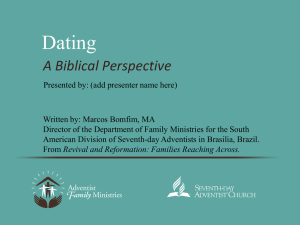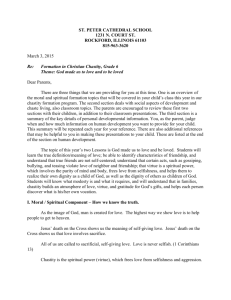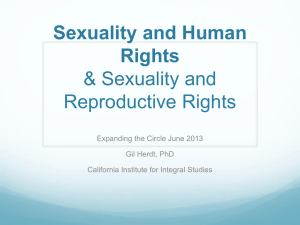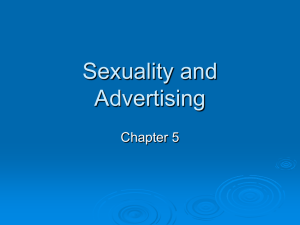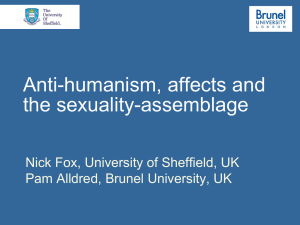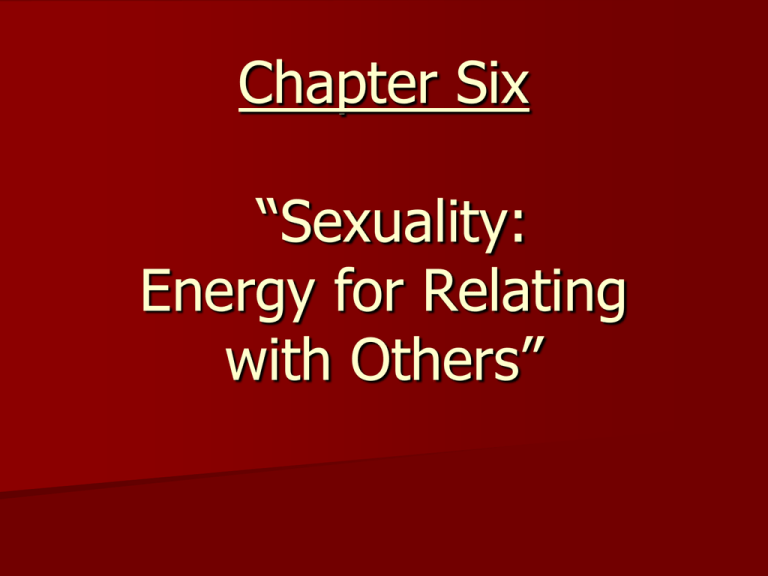
Chapter Six
“Sexuality:
Energy for Relating
with Others”
Section One: “Understanding Sexuality” (Pages 105—109)
1. What are two lessons about sexuality that can be found in
the Bible’s Book of Genesis?
Genesis teaches that we are created as sexual creatures by
God for relationship, to love and be loved, like God. It also
teaches that our sexuality is good and blessed.
2. What is the Song of Songs? What is its attitude toward
sexuality?
The Song of Songs, from the Hebrew Scriptures, is a
collection of wedding feast songs written for a husband and
wife to sing to each other. It affirms the goodness and lifegiving nature of sexuality and sees the sexual attraction of
lovers as beautiful and good.
3. What did St. Paul say about how we should treat our
body?
The body is the temple of the Holy Spirit, and we should use
our body for love, for the glory of God.
Conclusion: Sexuality is integral to being human and being
made in God’s image. It touches every facet of our lives and
is the immensely powerful energy behind all our
relationships. The Christian tradition affirms the goodness
and life-giving nature of sexuality, as well as the great value
of the human body. (CCC #356—361, 2331, and 2334.)
Section Two: “Valuing Ourselves as Sexual People”
(Pages109—115)
1. How do the media discourage us from being comfortable
with our body?
Most advertising takes advantage of our need to feel
attractive by equating our attractiveness with the products
being promoted. Some examples of how the media
discourage us from being comfortable with our body include
when they tell us there is always something wrong with us
unless we buy their product, when they promise us a
gorgeous body if we do buy their product, or when they try
to convince us that what we are currently wearing will not
make us attractive to the other sex, but what they sell us will
2. Briefly describe three disorders that give evidence of our
society’s obsession with bodily perfection.
The disorders of anorexia nervosa, and bulimia are
characterized by a pathological fear of gaining weight.
With anorexia nervosa, this fear leads to faulty eating
patterns, malnutrition, and excessive weight loss. Persons
who have bulimia tend to go on eating binges and then
induce vomiting to avoid weight gain. Another related
disorder is hypergymnasia, the tendency to exercise
excessively and dangerously to stay thin.
3. List seven habits that can promote a healthy body.
• Eating three healthy meals a day, including breakfast
• Avoiding fats and junk food
• Concentrating on grains and high fiber foods
• Exercising at least several times a week
• Getting adequate sleep—seven to eight hours each night
• Not smoking
• Avoiding alcohol, or drinking in moderation
4. Describe the notion of masculinity that probably
encourages domestic violence and abuse.
Men are in control, competitive, and dominating.
Men should be tough, not tender and emotional.
Above all, men should not be needy.
5. In what sense was Jesus a whole sexual person?
Jesus was a whole sexual person because he transcended
sexual stereotypes and used the full range of his intellect
and emotions in loving others.
Conclusion: Valuing ourselves as sexual persons is one of the
many factors upon which a healthy expression of sexuality
depends. It requires having a positive body image and
appreciating our masculinity and femininity, our whole self.
Jesus is a fitting model of sexually whole person because he
transcended sexual stereotypes and used the full range of his
intellect and emotions in his relationships. (CCC #2332.)
Section Three: “When Sexuality is Distorted”
(Pages 115—118)
1. Why is rape so harmful?
Rape is so harmful because it is a violent act that robs the
victim of her or his rights and dignity as a human being.
It is about violence, power, and domination, not about a
sexual relationship. Besides the physical harm and violation
of rape, it frequently leaves long-term emotional scars that
damage the victim’s capacity for trusting, intimate relations.
2. What is lust?
Lust is the desire to use another person as a non-person, as
an object for one’s own pleasure.
3. How does pornography deprive its users, rather than offer
sexual fulfillment?
Pornography deprive its users of sexual fulfillment because it
reduces sexuality to a depersonalized, secondhand experience
of genital sex. It tries to substitute mental pictures,
photographs, computer games or movies for human love.
In the process, it cheapens and dehumanizes sex, leaving its
users empty and deprived of the real relationships that the
sexual drive is meant to lead to.
4. What is the message behind advertising that uses sex to
sell products?
“You as a person are not essentially worthy or appealing to
others, but you will be if you have this product.”
5. What is a serious consequence of teenage pregnancy ?
That the teenage mother and father are usually too young
and immature to assume the enormous responsibility of
bringing up a child.
Conclusion: Sexuality is intended to bond us to others in love.
When the power and energy of sexuality are expressed in
unloving and uncontrolled ways, sexuality becomes distorted
and destructive to the individual and to society. Some of the
consequences of distorted sexuality that we find in society
include rape, lust, pornography, selling through sex, and
teenage pregnancy. (CCC #2351—2356.)
Section Four: “Chastity” (Pages 119—121)
1. What is chastity? How is it expressed for married, celibate,
and single people?
Chastity is a virtue that involves the integrity of a person,
the keeping of one’s sincerity and honesty in body as well as
in emotion and word. It also means showing passionate love
for ourselves, other people, and God, but in different ways
depending on whether we are married, celibate, or single.
For married people, chastity is expressed in a permanent,
genital commitment to their spouse that is both exclusive and
sensual.
Celibate people express chastity through a permanent,
non-genital commitment to God and to the world.
Chastity for single people means a temporary, non-genital
commitment of love to themselves, God, and others.
2. What is sexual intercourse meant to express and celebrate?
Sexual intercourse is meant to express the love married
partners have for each other and to celebrate the sharing
of their whole lives.
Conclusion: The Christian vision sees sexuality as best
expressed through the virtue of chastity, understood as keeping
one’s sincerity and honesty in body as well as in emotion and
word.
Chastity is expressed in different ways depending on whether
we are married, celibate, or single.
Sexual intercourse celebrates the shared life of two people who
permanently commit their whole selves to each other.




